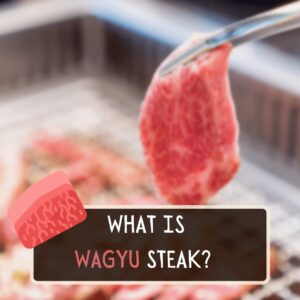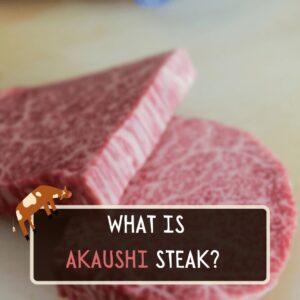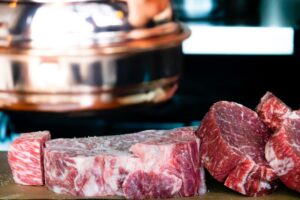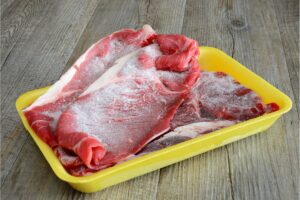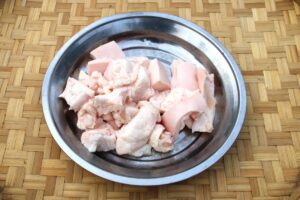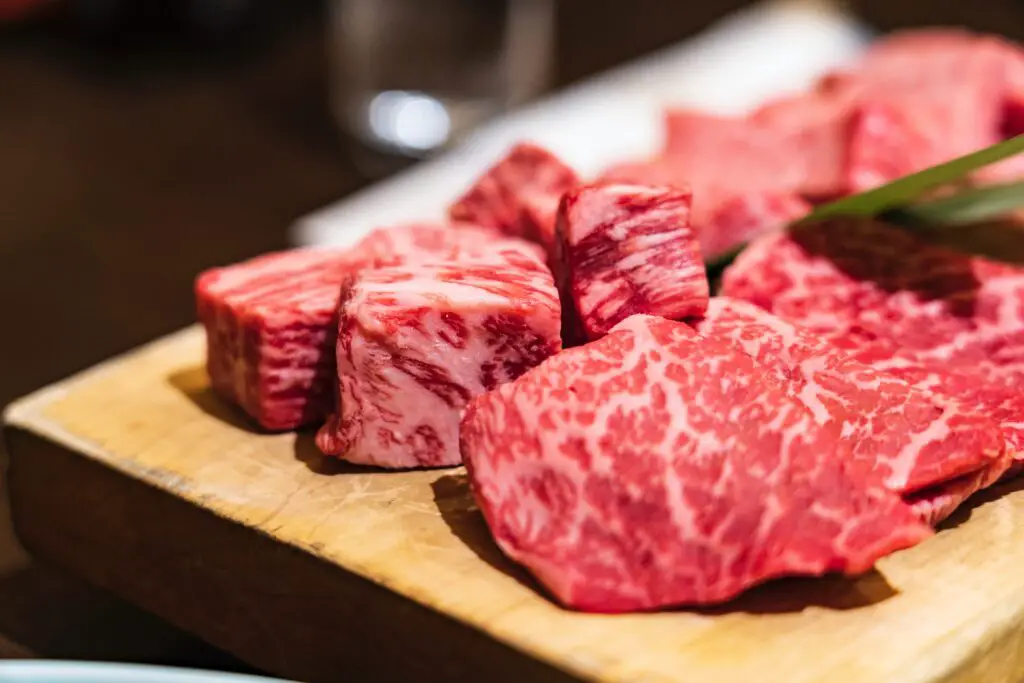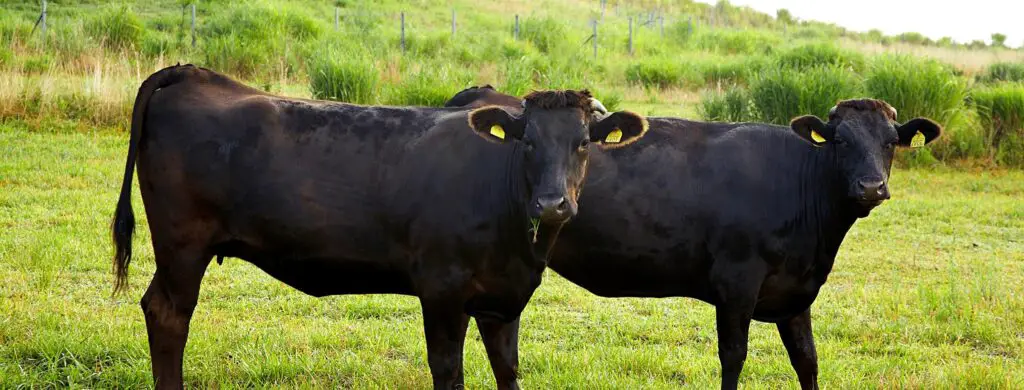
Wagyu translates literally to Japanese cow, so is kobe beef the same as wagyu? Wagyu can be used as a generic term for all beef from Japanese cows. Kobe beef is a subtype of Wagyu beef, but Wagyu beef is not a type of Kobe beef. If this seems confusing, think about it like this. All thumbs are fingers, but not all fingers are thumbs.
The Wagyu strain of cattle is believed to have originated about 35,000 years ago. In the late 1800s, Japanese cattle were crossbred with European cattle that had been imported. The descendants of this crossbreeding process are the cattle from which Wagyu beef comes.
Many types of Wagyu beef are not Kobe beef. These include Matsusaka, Ohmi, and Bungo. To classify as Kobe beef, the cow must have a lineage that can be traced back to certain cows – those from Tajima-Gyu.
There are 12 bulls kept at a secure facility that the Hyogo government values highly. Only if the genetics can be traced back to one of these bulls, can the beef be called Kobe.
In order for Kobe beef to be sold in other countries, such as the United States, there must be a permit issued by the Japanese authorities. Only 37 restaurants in the US have this permit. For a full list of restaurants in the States that hold this permit, click here.
There is a company known as Snake River Farms that sells American Kobe beef. This is not genuine Kobe beef and should not be sold under that name.
Which is better, Wagyu or Kobe beef?
Both types of beef are very high-quality meat. That being said, Kobe beef has to meet more exacting standards than generic Wagyu beef. This is an indicator that Kobe beef is of better quality.
Kobe beef is famous for its marbling of fat through the flesh. This is seen as an indicator of high quality. This fat melts at a low temperature meaning that the flavor of the meat becomes more buttery and succulent. This fat is also very high in healthy Omega-3 and Omega-6 fatty acids.
Kobe beef must be imported from Japan to be genuine, which adds to the cost. This means that you can be assured of the quality and genuineness of the meat. It has been raised and prepared by professionals who know everything there is to know about these cows.
How can you tell a real Wagyu beef?
There is a lot of counterfeit Wagyu beef on the market, particularly being found in lower-level restaurants. Wagyu beef comes from Japan and there are only 4 breeds of cow that the meat can be taken from.
These include Japanese Black, Japanese Brown, Japanese Polled, and Japanese Shorthorn cows. 90% of all Wagyu beef comes from the Japanese Black cattle.
Each of the breeds of cattle must be raised and slaughtered in a species-specific manner, in a particular region of Japan. Following the slaughter of the cow and once it has been processed by the abattoir the meat must be inspected. This is done by 3 separate, respected, and highly qualified professional inspectors.
The inspection is carried out to ascertain the grade of the beef before it is taken to the market. A5 is the highest and very few cattle are awarded this grade. The grading is based upon the marbling, yield, fat standard, firmness, texture, and color of the meat.
Genuine Wagyu beef will have a unique ID number and a certificate assigned to it. This means that you can trace the entire lifespan of the cow back and discover which farm it came from.
While hard to come by, you can buy genuine A5 Wagyu beef from CrowdCow.
What is more expensive, Kobe or Wagyu beef?
Kobe beef is more expensive than Wagyu beef. As we mentioned above, Kobe beef is like the gold medallist of Wagyu beef. It is said to be the meat with the most marbling in the world. It is creamy, flavorful, and indulgent with large streaks of delicious fat running through.
Kobe beef needs to meet 7 standards in order to gain this title. These are that the cow must be a bullock (steer) or a virgin cow. As we noted above, the cattle must be born from the Tajima-Gyu species in the Hyogo Prefecture. It must remain there throughout its life. The cows must be raised on the farm and the meat must be processed in this area too.
Upon inspection of the meat, there must be a BMS (beef marbling standard) of 6 out of 12 or higher. The meat quality rating needs to be 4 or above out of 5. Finally, the cow should not weigh more than 470 kilograms at the time of slaughter.
These stringent standards mean that only 3,000 to 4,000 cattle can be qualified as Kobe cattle every year. There are only 200 to 300 farms that raise Wagyu cattle which means that there is a somewhat limited supply. This adds to the cost of the beef.
What makes Wagyu beef special?
Aside from the special slaughter methods, there are other things that are different between traditional cattle and Wagyu cattle. The Wagyu cows are looked after impeccably, although the specific care requirements are shrouded in secrecy, even among the livestock industry.
Wagyu cattle have at least twice the amount of open-air, natural grazing time when compared to regular cattle. They eat primarily a feeding formula to ensure they get optimal levels of nutrition. The specifics of this formula are not publicized. They have continual access to fresh and clean water at all times.
Their diet is believed to consist of grasses, rice straw, forage, corn, wheat bran, soybeans, beer, and sake. The strong flavors of these foods are believed to improve the flavor of the final meat product.
Wagyu cattle live an incredibly laid-back life, and this is believed to result in a higher quality of meat. Any stress and problems are resolved as soon as possible to allow the livestock to remain calm at all times.
If you want to dig deeper you can read my article about why wagyu steak is so good.

